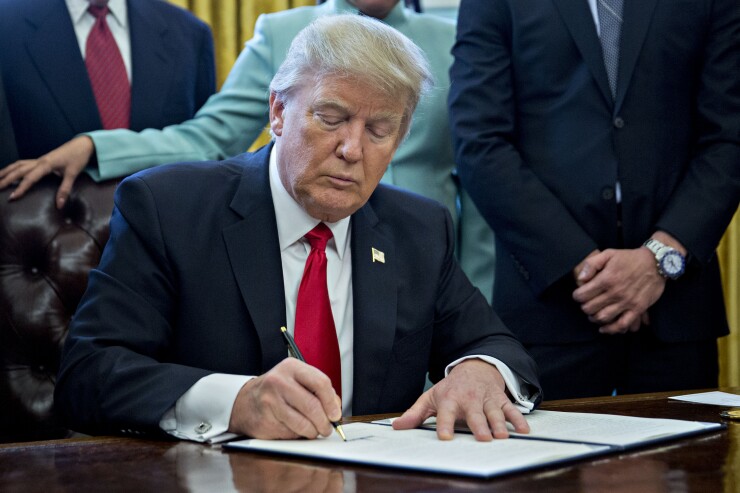Despite overwhelming support, retirement savings tax incentives always seem to be on the chopping block when it comes to tax reform.
“
The Coalition includes: American Benefits Council, American Retirement Association, Committee on Investment of Employee Benefit Assets, Inc., Defined Contribution Institutional Investment Association, Financial Services Roundtable, Investment Company Institute, New Economics for Women, Northern Trust, Plan Sponsor Council of America, Principal, SPARK Institute, TIAA and Women’s Institute for a Secure Retirement.
See also:
The Insured Retirement Institute has sent letters to the Trump administration and both houses of Congress regarding tax reform proposals; the organization wants to preserve the incentives that already exist that encourage people to save for their futures.

“With 30 million baby boomers at risk of not having enough retirement income and 10,000 Americans reaching retirement age every day, it is vital that tax reform protect existing tax treatment and tax-deferred savings incentives that spur retirement savings and economic growth,” says IRI President and CEO Cathy Weatherford. “These incentives play a key role in producing $25 trillion in retirement assets, accounting for 34% of all household assets in the United States. Data on global pension assets (defined contribution plans, defined benefit plans and IRAs) and data specific to annuities and the life insurance industry show that these assets are heavily invested in U.S equities and bonds and make other contributions that are vital to economic growth.”
Republicans in Congress are pushing a tax reform proposal that would simplify the tax code and eliminate complicated rules and special interest tax breaks. As part of their proposal, which was first put forward in 2016, they would reexamine retirement savings by exploring the creation of “more general savings vehicles, using as a model the retirement accounts that have proven so successful.”
The tax reform blueprint mentioned Universal Savings Accounts that would allow individuals to contribute money and have full control over their investment decisions. People would also be able to withdraw both contributions and earnings at any time, and for any reason, without penalty, according to the proposal.
The IRI has said that it would like the pre-existing tax treatment and tax-deferred savings incentives that spur retirement security and economic growth preserved. It also encourages Congress and President Trump to maintain the diversity of retirement account structures, like 401(k), 403(b) and 457(f) plans that are tailored for the employees of the private, governmental, church, educational and nonprofit sectors.
According to the GOP blueprint, the current tax incentives for savings would remain in place but the Committee on Ways and Means would “work to consolidate and reform the multiple different retirement savings provisions in the current tax code to provide effective and efficient incentives for savings and investment.”
Lee Covington, senior vice president and General Counsel for the IRI, said that when Congress examines the 10-year budget window to score tax expenditures, tax-deferred savings is the No. 2 tax expenditure on the books so it always gets a look and draws attention by members of Congress.
But, he points out, “it is tax-deferred. It is not tax exempt or tax-excluded. It will be taxed outside that window and the Congressional Budget Office numbers show that in the long run, 2016 to 2046, it will increase federal revenue and have a positive impact on GDP.”
In its 2004 report “Tax-Deferred Retirement Savings in Long-Term Revenue Projections,” the Congressional Budget Office estimated that federal revenue would increase by 0.5 percent of GDP over 75 years as a result of tax-deferred retirement accounts and about half of that increase would happen by 2030.
“Not having tax deferral would have a negative impact on small businesses creating plans, which would equate to fewer workers having access to plans under the current system,” Covington says. “I think everyone agrees it would have a negative impact on small businesses providing plans for workers.”
Another option that has been talked about is moving to a Roth plan, in which individuals pay taxes on the money before they save it, from a tax-deferral type of plan like a 401(k).
“Behavioral science shows that people just don’t save as much if they don’t have tax deferral, so overall, our number one priority is to protect the tax-deferred treatment of retirement savings,” he adds.
Eighty percent of households that have a retirement account say its positive tax treatment is a big incentive to contribute, according to the Save Our Savings Coalition, and “90% of households oppose both taking away the tax advantages of retirement accounts and reducing the amount individuals can contribute to retirement accounts.”
Retirement savings is an important driver of economic growth, according to the Coalition. “At the end of 2016, U.S. retirement assets totaled $25.3 trillion invested in the equity and fixed income markets, making American capital markets the largest and most liquid in the world. Those dollars power the economy by giving businesses the necessary funds to create more goods and services,” the group said in a news release.
The IRI also is asking members of Congress to focus on common sense bipartisan reforms that will increase workers retirement security through greater access to work place plans through multiple employer plans; helping workers accumulate savings through more automatic features; and increasing workers access to lifetime income products that provide a stream of income they can’t outlive.





